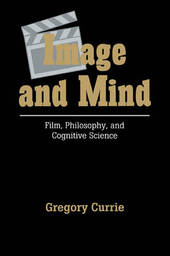
|
Image and Mind: Film, Philosophy and Cognitive Science
Paperback / softback
Main Details
| Title |
Image and Mind: Film, Philosophy and Cognitive Science
|
| Authors and Contributors |
By (author) Gregory Currie
|
| Physical Properties |
| Format:Paperback / softback | | Pages:332 | | Dimensions(mm): Height 228,Width 153 |
|
| Category/Genre | Film theory and criticism
Philosophy - aesthetics |
|---|
| ISBN/Barcode |
9780521057783
|
| Classifications | Dewey:791.4301 791.4301 |
|---|
| Audience | | Professional & Vocational | |
|---|
| Illustrations |
Worked examples or Exercises
|
|
Publishing Details |
| Publisher |
Cambridge University Press
|
| Imprint |
Cambridge University Press
|
| Publication Date |
28 January 2008 |
| Publication Country |
United Kingdom
|
Description
This is a book about the nature of film: about the nature of moving images, about the viewer's relation to film, and about the kinds of narrative that film is capable of presenting. It represents a very decisive break with the semiotic and psychoanalytic theories of film which have dominated discussion. The central thesis is that film is essentially a pictorial medium and that the movement of film images is real rather than illusory. A general theory of pictorial representation is presented, which insists on the realism of pictures and the impossibility of assimilating them to language. It criticizes attempts to explain the psychology of film viewing in terms of the viewer's imaginary occupation of a position within the world of film. On the contrary, film viewing is nearly always impersonal.
Reviews"Currie is often provocative, as when he analyzes the nature of film images and when he criticizes the theory of 'suture.'" Choice "In this important and impressive book, Gregory Currie tackles several fundamental topics in the philosophy of film and says much of general interest about the nature of imagination...Currie's book is a major contribution to the developing field of the philosophy of film, and also has important things to say about aesthetics and the philosophy of mind. It deserves to be widely read and admired." Berys Gaut, The Philosophical Review
|